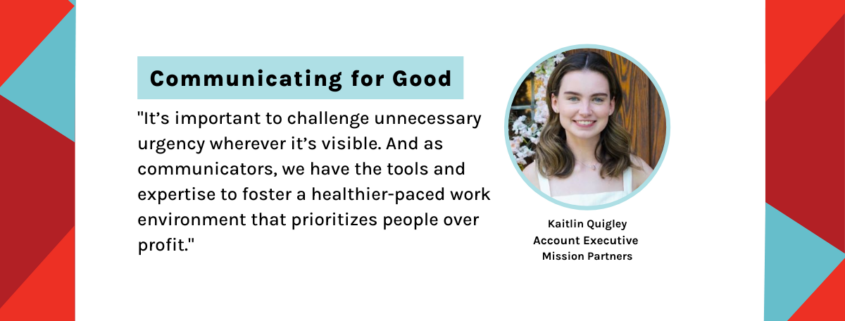Navigating a False Sense of Urgency in the Workplace
In a society that tends to prioritize productivity over well-being, it’s no surprise that many professionals are hesitant to take time for themselves during the workday. According to a study conducted by Tork in 2021, 39% of people occasionally, rarely, or never take breaks during their working hours, and 22% of people feel guilty when they do decide to unplug. This is despite the fact that the vast majority of professionals acknowledge they’re much happier when they do take breaks intraday.
As communicators, writers, design thinkers, and relationship builders, we know our skills are at their sharpest when we’ve taken time to reflect, rethink, and rest in between work blocks. When everything is urgent, it’s easy to lose track of our grounding intentions, or the vision we had when we set out on a given project.
Defaulting to urgency is so normal that I didn’t realize there was an alternative to this culture until the Mission Partners team started dissecting it. Together, we’ve tackled tough conversations about what urgency culture is, where it shows up in our workplace, and how we can combat it. False urgency is a white dominant norm that supports and is supported by other white dominant norms, including: overworking as an unstated expectation, perfectionism, and undermining the value of interpersonal, intrapersonal, and naturalistic intelligences.
I internalized a false sense of urgency at a young age, and it showed up heavily throughout my college career. My obsession with “keeping up” with the workloads of my classmates and exceeding expectations came at the expense of less time spent with friends, fewer calls home, heightened anxiety, and a lacking sleep schedule. But I didn’t immediately associate these unhealthy habits with urgency; I associated them with my fast-paced college environment. I soon found myself thinking, “once I graduate and develop a more structured work schedule, things will be better.” Eventually, I equated productivity with worthiness, and the more I could check off my to-do list in a day, the better I felt about myself.
As a recent college graduate still forcing unrealistic expectations on myself, I now realize that my sense of urgency doesn’t know boundaries. It wasn’t location-based. It didn’t evaporate when I left college. Left unaddressed, urgency will manifest wherever it’s invited. In a workplace, it’s particularly important to challenge unnecessary urgency wherever it’s visible. And as communicators, we have the tools and expertise to foster a healthier paced work environment that prioritizes people over profit.
Here are some ways you can avoid communicating with a false sense of urgency in your workplace:
- When delegating a task, be clear about the timeline and where it ranks in terms of priority. When several important action items arise simultaneously, it’s important to not misuse “urgency” as a synonym for “efficiency.” Instead of attempting to tackle every task at once, take a step back and discuss the top priorities with your team. And to avoid creating unnecessary stress and urgency, ensure any timeline expectations living in your brain or in the margins of your notebook are making it to a shared space that your team can access. This way, the lines of communication between you and your colleagues are open—and truly efficient.
- Avoid sending late-night and weekend emails. While you may not anticipate an immediate response to the note you sent outside of office hours, late-night and/or weekend email notifications can be stress-inducing and disrupt a colleague’s time for recharging. Consider scheduling an email for your colleague’s in-office hours. You can also add an acknowledgment of your working hours and response expectations to your email signature. At Mission Partners, many of us use variations of this message: I currently work [location] business hours, or sometimes later. I recognize my working hours may not be your working hours. Please do not feel the need to respond urgently to emails sent outside of your working hours.
- Get ahead of urgency by making a plan. Sometimes, our best work requires more time than our busy calendars allow. Given the amount of thought, strategy, and research that goes into a day’s worth of work as a communications professional, it’s critical to get ahead of big deadlines whenever possible. We can do our best to avoid feeling overwhelmed with urgency by leaning into proactivity. And instead of allowing work to trickle into nights and weekends in instances where planning ahead isn’t possible, consider how you can reconfigure your priorities and lean on your team for support in getting deliverables to the finish line.
In the end, there’s no amount of management software that can combat a false sense of urgency at work. Prioritizing your team’s well-being must begin with clear communication about timeline expectations, work-life boundaries, and time for project preparation that not only allows space for wellness breaks, but encourages them. Conversations about company culture may be imperfect and uncomfortable, but they’re an integral part of communicating for good and achieving a realistically-paced work environment.
Want more insights about combating urgency at work? Check out these blogs on achieving a realistic pace in the workplace by Carrie Fox and challenging hustle culture by Nimra Haroon.





 Check out our new
Check out our new